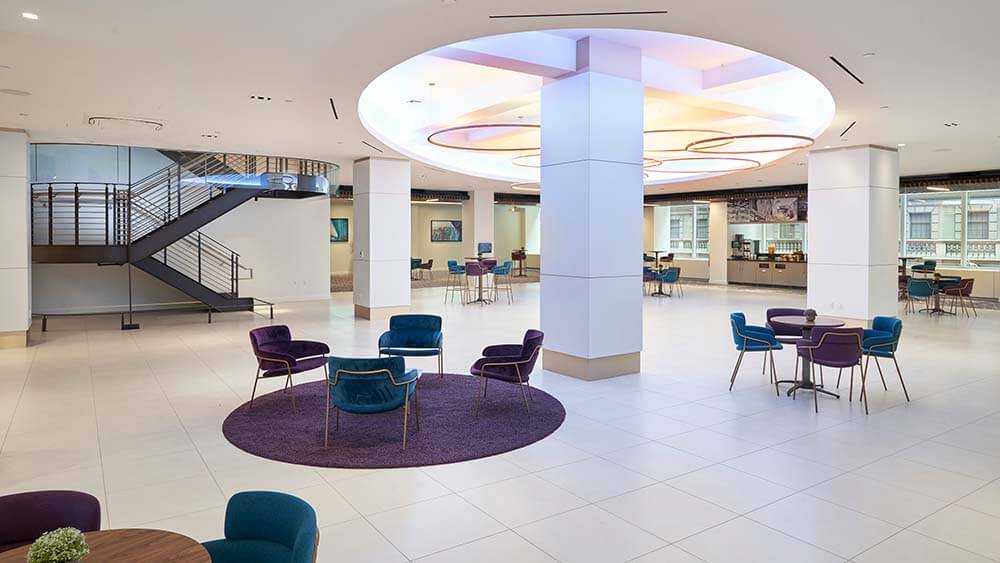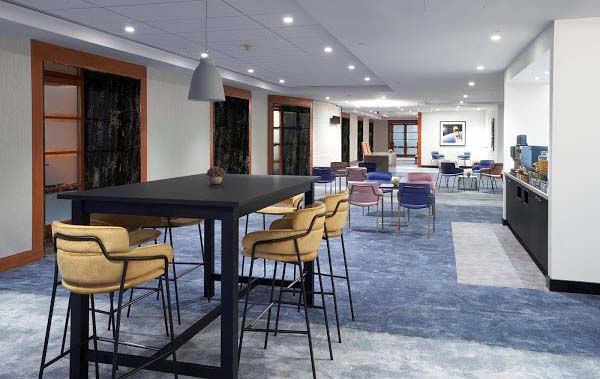
Business at etc.venues’ New York hybrid work spaces, including the one at 360 Madison Avenue (above), has been picking up recently, a sign that demand for meeting space is rebounding. (Photos courtesy etc.venues)
Garrett Ronan, chief operating officer for etc.venues USA, oversees two venues in New York City, the first U.S. venues to be established as part of U.K.-based etc.venues. The company creates meeting spaces that emphasize natural light, inspiring décor, flexible space, and turn-key packages that include chef-prepared F&B, built-in AV, and high-speed Wi-Fi.
Pre-COVID, the company’s 15 U.K.-based venues hosted 19,000 meetings a year. In New York, where the company’s first venue opened just as the pandemic was beginning in 2020, Ronan’s phone recently has been ringing a lot — a welcome sign, he said in an interview with Convene, that the demand for meeting space is rebounding. Ronan is seeing another pattern emerge as well, this one related, he said, to the shifts that are taking place in workplaces.

The etc.venues space at 601 Lexington in New York was once an in-house conference center operated by Citibank.
As a regular commuter to Manhattan, Ronan is witnessing the growing trend toward hybrid offices where workers come in just three days a week — he sees crowds of professionally dressed New Yorkers primarily on Tuesdays, Wednesdays, and Thursdays, he said. And, in his role with etc.venues, he’s hearing increased interest by corporations in scheduling regular “town hall” meetings to get geographically dispersed employees together to communicate and collaborate with one another, Ronan said. Callers are asking more questions that drill down into the venues’ features and amenities, as they consider how to make the most of the time when teams do come together.
Companies also are reducing the amount of space that they lease; in a survey of Fortune 500 CEOs, 74 percent said they would need less office space in the future. At etc.venues space at 601 Lexington in New York, which formerly operated as an in-house conference center by Citibank and was remodeled by etc.venues, Ronan’s team works directly with the building’s owners to offer tours of the space to prospective corporate clients. “Honestly,” Ronan said, “you see their eyes light up,” at the realization that they could reduce the size of their office footprint and access high-quality, full-service meeting space at the same time.
This trend was highlighted in “Do You Really Need All That Office Space?” a July 2021 Harvard Business Review article in which authors Nikodem Szumilo and Thomas Wiegelmann pointed out that “the quality of the space should become more important than the quantity” in a hybrid work environment — that “companies are likely to focus on smaller spaces that provide better services and amenities.”
Better service is part of etc.venues’ ethos — their spaces are staffed by event professionals, whose expertise and attention to hitting all the marks on hospitality and human interaction is another selling point, Ronan said. “We want that interaction where there’s somebody in the lobby to meet you and welcome you and open the elevator for you — that polish,” he said. “We want that elevated food experience. We’re human and we need humans. We need that interaction.”
Barbara Palmer is deputy editor at Convene.
